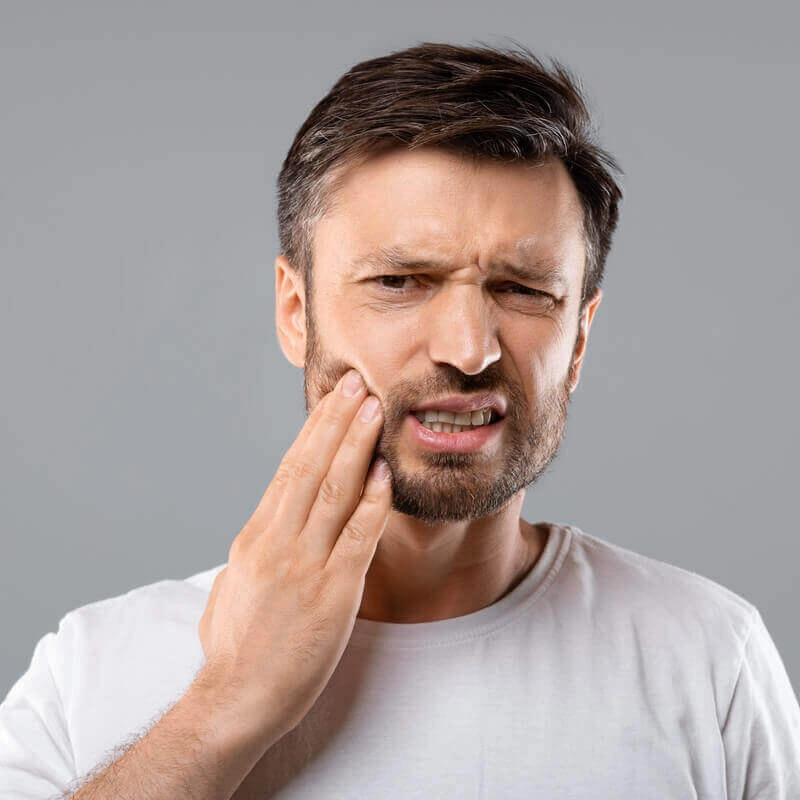Home/Wellness Zone/Sakra Blogs
22nd Feb, 2021

Pulpitis is an inflammation of the dental pulp tissue and is usually caused by bacterial infections (majorly tooth decay). The pulp comprises the blood vessels, the nerves and connective tissue which provide blood and nutrients to the tooth.
The article is curated to help you understand Pulpitis in detail. Here is what the article will cover:
1. What is Pulpitis
2. Types of Pulpitis
3.0Signs and Symptoms of Pulpitis
4. Causes of Pulpitis
5. How is Pulpitis Diagnosed
6. Treatment for Pulpitis
What is Pulpitis
As stated at the onset, Pulpitis is a dental condition that results in an inflamed dental pulp. The dental pulp is a vital part of the tooth structure, originating at the centre of the tooth, underneath the enamel layer and the dentin layer (the material that helps to support the structure of the tooth).
The dental pulp has important functions:
Sensory function: Any pain from differences in temperature, tooth trauma or pressure are caused by stimulation of the pulp.
Formation of dentin: The dental pulp is responsible for the formation of dentin.
Nutrients and nourishment: The blood vessels in the pulp are responsible for providing the necessary nutrients to the tooth.
If Pulpitis is left untreated, it can also cause an infection at the root of your tooth, which is known as an abscess. It's important to see your dentist at the earliest possible if you think you have Pulpitis.
Signs and Symptoms of Pulpitis
The severity of the symptoms depends on the type of Pulpitis. Reversible Pulpitis typically causes mild symptoms. While irreversible Pulpitis may cause severe pain and is long-lasting.
Here are a few common symptoms of Pulpitis:
sharp and throbbing tooth pain
sensitivity to hot, cold food and beverages
inflammation of the tooth
a fever (very common in severe cases)
unpleasant taste in the mouth or bad breath
difficulty eating and chewing
Swelling of the face and cheeks
swollen lymph nodes
Causes of Pulpitis
The most common cause of Pulpitis is a bacterial infection, however, the causes are generally categorised into physical, chemical and bacterial.
Physical causes of Pulpitis (mechanical injury or thermal injury): Mechanical injury is majorly caused due to dental trauma. For example, habits like bruxism (grinding of teeth at night), using foreign objects like hairpins, needles, are among the causes of tooth trauma. Besides this, certain dental treatments could also cause dental trauma, treatments where the pulp is highly exposed.
An example of thermal injury would be the heat produced during the polishing of a tooth filling which affects the dental pulp and damages it.
Other physical causes include cracked or chipped tooth or tooth fracture.
Chemical causes of Pulpitis: excessive use of desensitizing toothpaste, or pulp reaction to components like arsenic present in silicate used in tooth restorations.
Bacterial infection is the most common cause of pulpitis.
These irritants cause reversible Pulpitis initially, however, If the pulp continues to be inflamed, the Pulpitis will become irreversible, which may eventually lead to a dead tooth.
How is Pulpitis Diagnosed
Diagnosis is based on the history and physical examination of the patient. X-rays are also used to determine the inflammation and other valid tooth conditions that help the dentist understand the severity of the case.
Here are a few tests that are done for diagnosing Pulpitis
Sensitivity test: To check if hot or cold stimuli causes any pain or discomfort.
Tooth tap test: This test is done to test the level of inflammation. An instrument is used to gently tap on the tooth.
Electric pulp test: An electrical charge is delivered to the pulp. If the patient feels the small electrical charge delivered to the tooth, the pulp is alive and reversible.
Treatment
The treatment depends on the type of Pulpitis. There are two types of Pulpitis:
Reversible Pulpitis:
Reversible Pulpitis is the condition in which the dental pulp is inflamed, but reverts to normal once the person treats the underlying cause of the inflammation.
Consult the dentist at Sakra World Hospital for reversible pulpitis treatment in Bangalore.
For example: If the damage to the tooth is caused by a cavity or a fracture, the dentist may repair the tooth to protect the pulp. Once the source of irritation is fixed, the pulp should return back to normal. In this type of Pulpitis, the inflammation of the pulp tissue is generally mild to moderate. Although reversible Pulpitis is quick to heal, periodic evaluation is necessary to ensure the complete healing of the condition.
Looking for the best dentist in Bangalore for pulpitis treatment, then consult the Sakra World Hospital, the best dental hospital in Bangalore.
Irreversible Pulpitis:
Irreversible Pulpitis means the nerve has been damaged beyond repair, and the inflammation in the pulp cannot be reversed. The root canal and complete tooth removal are the options a dentist will inform you about. However, tooth removal is not the first line of treatment if the tooth can be saved. A root canal will remove the infected pulp and once this treatment is done, the pulp will not regenerate inside your tooth, and the tooth is then a non-vital tooth.
To prevent Pulpitis, practice and maintain good oral hygiene, this will remove the bad bacteria from the mouth. If left untreated, Pulpitis can lead to complications such as dental abscess, which is an infection in the bone or soft tissues and is the reason for the formation of pus beside the tooth.
Our team of dental professionals will always advise you to see the dentist at the first sign of pain, sensitivity, or inflammation in the mouth. And yes, never miss your regular dental checks.
Enquire Now
